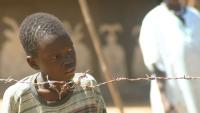Measuring Separation in Emergencies

Democratic Republic of Congo, Sudan
PROGRAM FACULTY: Lindsay Stark
OTHER FACULTY: craig spencer (Medicine)
STUDENTS: Hani Mansourian (Phd candidate), Eva Noble '15, and MAKINI CHISOLM-STRAKER '15
Emergency situations can have devastating effects on families and children, often leading to minors becoming separated from their usual caregivers through sudden displacement, force, or difficult decisions driven by lack of resources. In these contexts, identifying protective programs for these unaccompanied and separated children (UASC) and reuniting them with families is among the most significant interventions that humanitarian actors can undertake. However, the lack of robust data available on UASC in emergencies makes it extremely difficult to raise adequate and timely funding, design and implement the most appropriate programs, strengthen relevant child protection systems, and influence national / inter-national policies and laws relating to separation. While current tools meet certain rapid assessment needs, there is a clear need to improve on these methods to estimates the scale and nature of the UASC population.
With support from USAID’s Office of Foreign Disaster Assistance and working in concert with partners including Save the Children, UNICEF, Better Care Network, InterAction, International Rescue Committee, and UNHCR, the Child Protection in Crisis Learning Network designed the Measuring Separation in Emergencies project to fill this gap. This project proposes and tests 3 different tools to be used together and separately in both chronic and rapid-onset emergencies. Two pieces, a household survey and a mobile phone-based community surveillance tool, were tested in the Democratic Republic of Congo in 2014. The results of this successful pilot have led to further refinement of both tools and an extension of the program to include a new approach based on enumerating the scale of children in residential care institutions. Further piloting will take place in new contexts in 2015 and 2016, including South Sudan in November, to build a broad and varied knowledge base around the potential for this suite of tools.